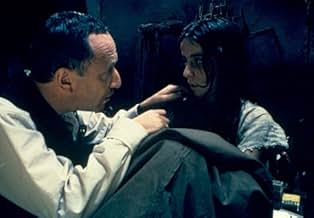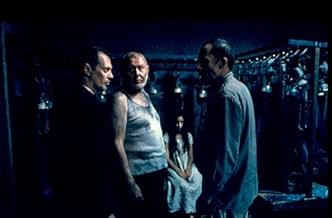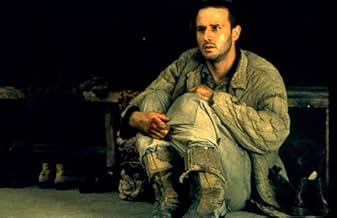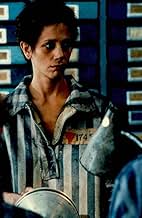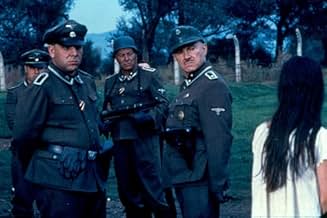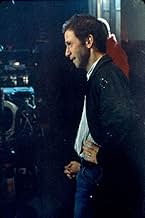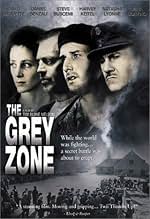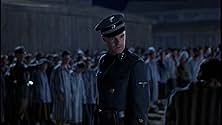Um médico nazista, junto com o Sonderkommando, judeus que são forçados a trabalhar nos crematórios de Auschwitz contra seus colegas judeus, encontram-se em uma zona moral cinzenta.Um médico nazista, junto com o Sonderkommando, judeus que são forçados a trabalhar nos crematórios de Auschwitz contra seus colegas judeus, encontram-se em uma zona moral cinzenta.Um médico nazista, junto com o Sonderkommando, judeus que são forçados a trabalhar nos crematórios de Auschwitz contra seus colegas judeus, encontram-se em uma zona moral cinzenta.
- Direção
- Roteiristas
- Artistas
- Prêmios
- 1 vitória e 3 indicações no total
- Lowy
- (as Georgy Zlatarev)
- Anja
- (as Lisa Benavides)
- Woman Inmate
- (as Dafina Katzarrska)
Avaliações em destaque
There are several reasons you must see this film. First, it is based on the diary of Dr. Miklos Nyiszli, a Hungarian Jew chosen by Josef Mengele to be the head pathologist at Auschwitz. And it dramaticizes the true attempt by Sonderkommandos to destroy the Auschwitz gas chambers.
Second, it focuses on ethical dilemnas faced by Dr. Nyiszli and the various Sonderkommandos who are trying to save themselves, their families, or ... just someone ... anyone. To say that these men were "co-opted" by the Nazis is to ignore the horror of the coercion, debasement and dehumanization that the Nazis inflicted -- not only on their prisoners, but upon themselves. One can imagine that some Sonderkommandos were selfish -- just as some Kapos were cruel and some doctors who assisted the Nazis were accomplices. But the question remains -- what would you have done in the face of such coercion and duress?
Third, the film -- based on Tim Blake Nelson's play -- is not the typical Holocaust film. There is very little redeeming behavior. There is no uplifting ending. The grey zone of moral ambiguity is presented as a cold, unfeeling, horrifying place -- where you are damned if you do, and damned if you don't -- which means that they are all damned! For the first third of the film, the script is obtuse, confusing, and disconnecting -- as it should be, considering that we may as well be taking the point of view of someone who just arrived on a train and entered the gates of hell. How can any of this make sense? In the opening scene, the Doctor is asked to save the life of a Jew who attempted suicide. How absurd can that be -- to save the life of someone who will sooner rather than later be murdered by the Nazis anyway?!
In conclusion, the play/film contains dialogue and scenes that are memorable. This is one of my favorites. One Jewish leader is demanding that they destroy the gas chambers as soon as possible. But another Jewish leader is still planning on escape, arguing that he has every right to expect to live. The first leader replies, something to the effect that, after what he has seen and done, he does not want to live!
Today is Holocaust Memorial Day, April 18, 2004. Last night, after seeing a Holocaust documentary on Kurt Gerron ("Prisoner of Paradise") a friend of mine asked me what I would have done? I told her that it would depend on whom I was caring for -- my wife and my daughters -- my parents. It was then that I realized that I would have probably done everything that every Jew did during the Holocaust. I would have tried to save myself and my family. I would have abandoned others -- even betrayed others. I would have killed. I would have fought the Nazis. And I would have probably been killed for it. I would have despaired -- tried suicide -- become depressed, useless to everyone. I don't think I would have survived. I think the only question in that regard -- and it shows how irrelevant the question really is -- is "how soon would I have died." That is why I remember Holocaust Memorial Day -- so that I will never forget -- and I can help work towards a time when such a hell will not occur in Europe, in Africa, in the Middle East, in the US, ... anywhere.
It's images are haunting.
Do to its depressing topic and even more disturbing ending others have criticized this movie as not being "entertaining". In fact it is entertaining. It is a horror movie of the real kind. The horror of human evil based on prejudice and hatred.
Everyone needs to see this movie, with the exception of those who lived through it, as they already know!
horrifying spectacle I vowed to never see it again. It is absolutely
among the most graphic, violent films ever made, save slasher/horror films. I saw it again to see what was buried
underneath the gore. It was surprising. As a historical document
alone The Grey Zone is unique and impressive. Countless small
details contribute to its originality: the blue-green color of the
Zyklon B crystals, the sprinklers constantly working the lawn
beside the crematoria, the clear, pretty daylight when the trains
arrive, the intimate building-to-building geography of Birkenau --
only the film Shoah manages to make these small historical
details count so much. What's left to be said about the Holocaust?
These things. Small things. Details. The grass, the sound ovens
make, sunlight hitting brick. Shoes. Luggage.
The Grey Zone is so unique that it has been misinterpreted. There
is virtually no music, nothing to tell you how to feel. It is exactly the
opposite of melodrama. The mundane repetition of the killings
actually numbs you after awhile, and this is intentional since this is
how the main characters are affected. There is no uplifting
message, and no cliched Zionist coda like Schindler's List
suggesting that all the suffering had a destination and a design.
There are some awkward elements in the film. But these are
minor next to the clarity of purpose and originality. The Grey Zone
should not become marginalized in the canon of Holocaust art
because it refuses to be sentimental. Hopefully it will be
referenced and reviewed for a long time.
Você sabia?
- CuriosidadesWriter and Director Tim Blake Nelson made Dr. Miklos Nyiszli's memoirs "Auschwitz: A Doctor's Eyewitness Account" (1946) mandatory reading for the film's cast, along with Primo Levi's "The Drowned and the Saved" (1986) and Filip Müller's "Eyewitness Auschwitz" (1979).
- Erros de gravaçãoAfter the men set the crematoria 4 on fire they tore down the fences and fled into the woods. They barricaded themselves in a barn where SS caught them. They were burned alive inside the barn.
- Citações
Hoffman: I used to think so much of myself... What I'd make of my life. We can't know what we're capable of, any of us. How can you know what you'd do to stay alive, until you're really asked? I know this now. For most of us, the answer... is anything. It's so easy to forget who we were before... who we'll never be again. There was this old man, he pushed the carts, and on our first day, when we had to burn our own convoy, his wife was brought up on the elevator. Then his daughter... and then both his grandchildren. I knew him. We were neighbors. And in 20 minutes, his whole family, and all its future, was gone from this earth. Two weeks later, he took pills and was revived. We smothered him with his own pillow, and now I know why. You can kill yourself. That's the only choice. I want them to save you. I want them to save you more than I want anything. I pray to God we save you.
- ConexõesFeatured in WatchMojo: Top 10 Holocaust Films (2014)
- Trilhas sonorasRoses from the South Op. 388
(1880)
Composed by Johann Strauss (as Johann Strauss)
Orchestrated and arranged by Jeff Danna and Andrew Lockington
Performed and conducted by members of the Bulgarian Symphony Orchestra
Principais escolhas
Detalhes
- Data de lançamento
- País de origem
- Central de atendimento oficial
- Idiomas
- Também conhecido como
- The Grey Zone
- Locações de filme
- Empresas de produção
- Consulte mais créditos da empresa na IMDbPro
Bilheteria
- Orçamento
- US$ 5.000.000 (estimativa)
- Faturamento bruto nos EUA e Canadá
- US$ 517.872
- Fim de semana de estreia nos EUA e Canadá
- US$ 24.526
- 20 de out. de 2002
- Faturamento bruto mundial
- US$ 621.592
- Tempo de duração1 hora 48 minutos
- Cor
- Mixagem de som
- Proporção
- 1.85 : 1


